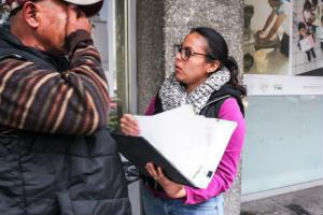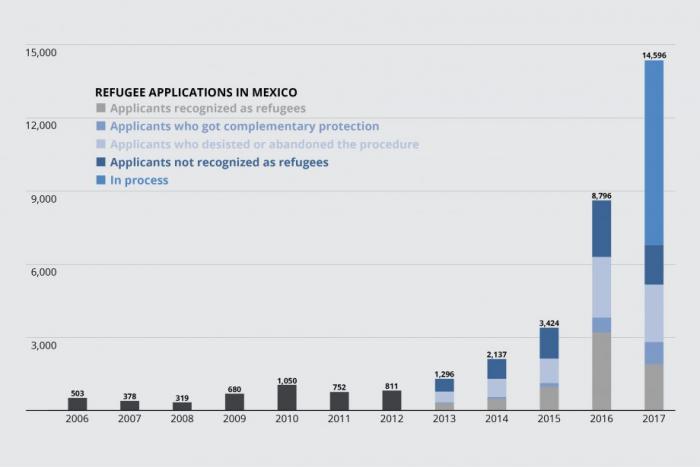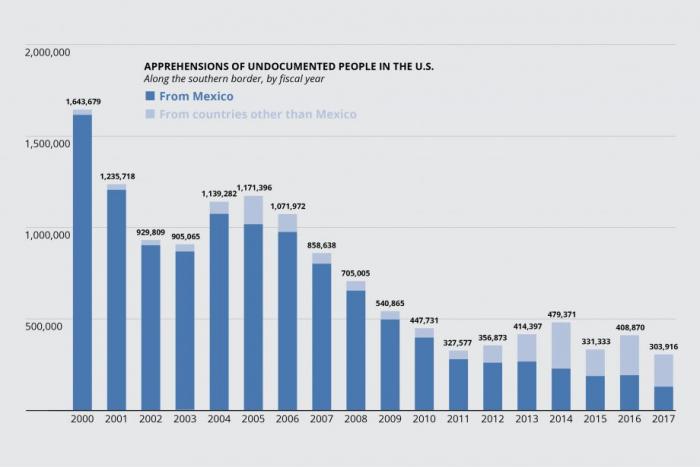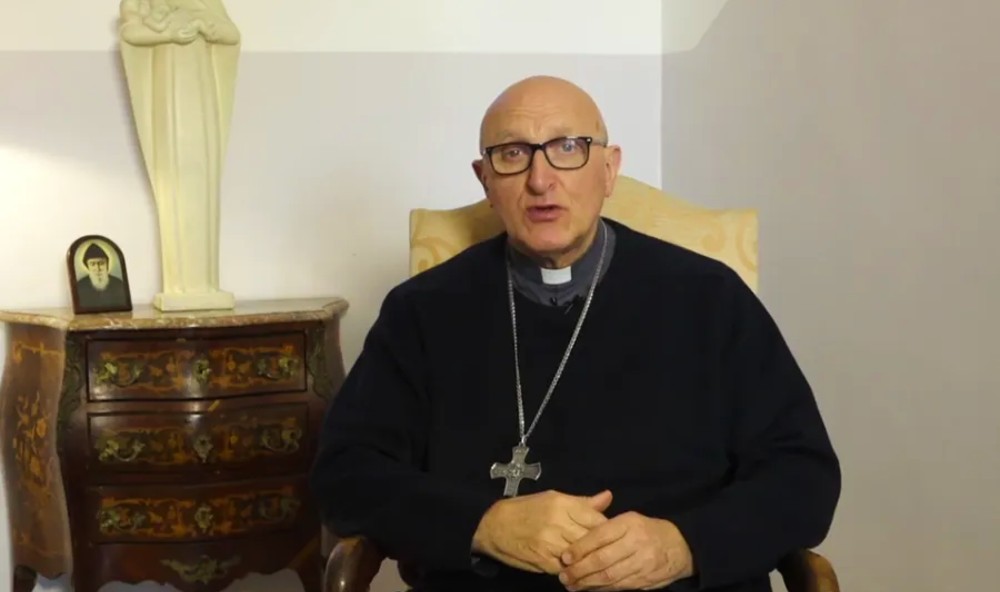We ask you, urgently: don’t scroll past this
Dear readers, Catholic Online was de-platformed by Shopify for our pro-life beliefs. They shut down our Catholic Online, Catholic Online School, Prayer Candles, and Catholic Online Learning Resources—essential faith tools serving over 1.4 million students and millions of families worldwide. Our founders, now in their 70's, just gave their entire life savings to protect this mission. But fewer than 2% of readers donate. If everyone gave just $5, the cost of a coffee, we could rebuild stronger and keep Catholic education free for all. Stand with us in faith. Thank you.Help Now >
Facing Extreme Risk on the Journey North, Many Central Americans Choose to Stay in Mexico
FREE Catholic Classes
Stories about the desperate migrants who clamber into the U.S. across its southern border fuel an intense debate over immigration, but a quieter story is playing out along the roads leading north from Chiapas, Mexico's southernmost state.

Highlights
Catholic Online (https://www.catholic.org)
7/9/2018 (6 years ago)
Published in Living Faith
Keywords: Extreme risk, Journey north, Centeral americans
MEXICO CITY, MEXICO -- Those who might otherwise proceed north are increasingly breaking away from the well-worn migration path and applying to remain in Mexico, instead of pushing on to the U.S.
A key factor in the shift away from the U.S. and toward Mexico as a preferred final destination is an effort by UNHCR, the United Nations' refugee division, to inform people of their options. The agency opened an office in Tapachula, a city near Mexico's border with Guatemala, more than a decade ago, but officials there have recently expanded their work to identify migrants eligible for refugee status. The agency also now posts signs in those centers and along migration routes to provide information about the process of seeking asylum in Mexico.
Migration experts say the UNHCR's efforts in southern Mexico have significantly changed how people seek safety in their journeys north from Honduras, El Salvador and Guatemala, the three countries that make up the violent region known as the Northern Triangle.
More than 30,000 people applied for some form of protective status in Mexico between 2013 and the end of 2017, and about half of those '" 14,596 '" submitted their applications last year, according to statistics from the ComisiĂłn Mexicana de Ayuda a Refugiados (COMAR), the government agency responsible for handling refugee requests.

Source: Comision Mexicana de Ayuda a Refugiados (COMAR)
That's more than 11 times the number of people who applied for refugee or a similar status in Mexico five years ago, when just 1,296 applicants were registered.
Elba Coria Marquez, director of the Clinica Juridica para Refugiados Alaide Foppa, the legal clinic at Universidad Iberoamericana, says the increase in applicants is because more people are aware of the possibility of obtaining legal status in Mexico. Her clinic engages with migrants in shelters to help them understand the risks they might face at the U.S. border '" information that often convinces them to try their luck in Mexico instead.
In general, Mexico's bar for refugee status is lower than that of the U.S., where a person must prove that he or she faces a personal threat, violence or persecution. Mexico's definition of a refugee is similar to UNHCR's, which requires only that the applicant prove that he or she is fleeing widespread violence or persecution.
Mexico also offers complementary protection, which is granted to those who might not technically meet the benchmark for refugee status, but who can still prove that they're fleeing grave threats at home.
The process of obtaining refugee status or complementary protection in Mexico can be harrowing. (Read more about it here.) Some human-rights advocates say many who are legitimately fleeing violence or persecution struggle to access Mexico's refugee-identification system at all. According to a 2016 report by Human Rights Watch, fewer than 1 percent of the children apprehended by Mexican immigration authorities are ultimately recognized as refugees or receive other formal protection in Mexico, even though many of them legitimately fear for their safety in their home countries.
Even so, many people from the Northern Triangle and other troubled countries now see an attempt to cross the U.S. border as a last resort. Efforts to cross the border illegally '" whether by crawling through the desert or swimming across the Rio Grande '" can result in death.
Even following the letter of the law when it comes to asylum application in the U.S. can have devastating consequences. People who present themselves at a legitimate port of entry with the intention of applying for asylum '" a legal method of launching an asylum application '" have been separated from their children, detained in jail-like detention centers or deported.
Northern-Triangle residents are aware that the U.S. has tightened its borders and at times uses harsh methods to deter would-be refugees, says Eunice RendĂłn, coordinator of Agenda Migrante, a Mexico-based organization that advocates for migrants.

Source: U.S. Customs and Border Protection
This makes it so that many, who before only traveled through our country, today see it more and more as a country of refuge," she says.
Mayela Sanchez, GPJ, contributed reporting.
Rishi Khalsa, GPJ, translated one quote from Spanish.
A version of this story originally appeared on Global Press Journal.
Support FREE Catholic Education
---
'Help Give every Student and Teacher FREE resources for a world-class Moral Catholic Education'
Copyright 2021 - Distributed by Catholic Online
Join the Movement
When you sign up below, you don't just join an email list - you're joining an entire movement for Free world class Catholic education.
-

-
Mysteries of the Rosary
-
St. Faustina Kowalska
-
Litany of the Blessed Virgin Mary
-
Saint of the Day for Wednesday, Oct 4th, 2023
-
Popular Saints
-
St. Francis of Assisi
-
Bible
-
Female / Women Saints
-
7 Morning Prayers you need to get your day started with God
-
Litany of the Blessed Virgin Mary
Meta's New Commitment to Free Speech and Its Potential Impact on Online Discourse
-

Pope Francis Accepts Resignation of Bishop Dominique Rey of Frejus-Toulon
-

Bound by Betrayal: Katie's Struggle with Lust, Lies, and Redemption
-
John: A Story of Addiction, Hopelessness, and the Search for Redemption
-
Science vs. Faith: The Battle for Truth and Hope
Daily Catholic
 Daily Readings for Wednesday, January 08, 2025
Daily Readings for Wednesday, January 08, 2025 St. Thorfinn: Saint of the Day for Wednesday, January 08, 2025
St. Thorfinn: Saint of the Day for Wednesday, January 08, 2025 Prayer for a Blessing on the New Year: Prayer of the Day for Tuesday, December 31, 2024
Prayer for a Blessing on the New Year: Prayer of the Day for Tuesday, December 31, 2024- Daily Readings for Tuesday, January 07, 2025
- St. Raymond of Pennafort: Saint of the Day for Tuesday, January 07, 2025
- St. Theresa of the Child Jesus: Prayer of the Day for Monday, December 30, 2024
![]()
Copyright 2024 Catholic Online. All materials contained on this site, whether written, audible or visual are the exclusive property of Catholic Online and are protected under U.S. and International copyright laws, © Copyright 2024 Catholic Online. Any unauthorized use, without prior written consent of Catholic Online is strictly forbidden and prohibited.
Catholic Online is a Project of Your Catholic Voice Foundation, a Not-for-Profit Corporation. Your Catholic Voice Foundation has been granted a recognition of tax exemption under Section 501(c)(3) of the Internal Revenue Code. Federal Tax Identification Number: 81-0596847. Your gift is tax-deductible as allowed by law.







 Daily Readings for Wednesday, January 08, 2025
Daily Readings for Wednesday, January 08, 2025 St. Thorfinn: Saint of the Day for Wednesday, January 08, 2025
St. Thorfinn: Saint of the Day for Wednesday, January 08, 2025 Prayer for a Blessing on the New Year: Prayer of the Day for Tuesday, December 31, 2024
Prayer for a Blessing on the New Year: Prayer of the Day for Tuesday, December 31, 2024


